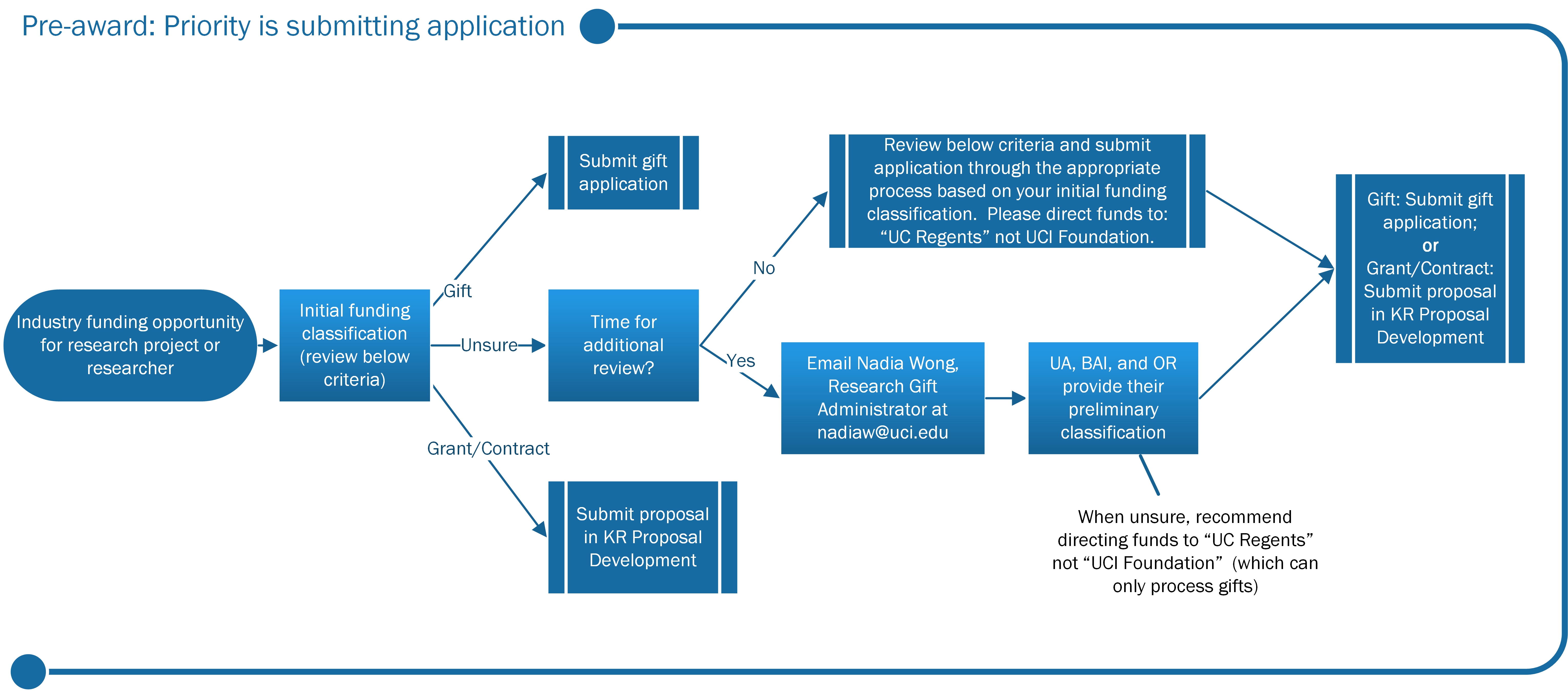Gift vs. Grant Classification for Industry/For-profit Sponsors
Accurate classification of funding (gift vs. grant vs. contract) is done in collaboration between University Advancement (UA), Beall Applied Innovation (BAI), and Office of Research (OR) based on the funder's intent and requirements and compliance with University policies and Federal and State mandated regulations, and is not done by the School of Physical Sciences. The Regents of the University of California operates as a tax-exempt, public non-profit educational institution and therefore must abide by specific guidelines when receiving funds from for-profit entities. UC Irvine cannot waive or reduce the overhead/indirect costs return rate on for-profit entities’ grants and contracts; for no overhead return, the award must be processed as a gift.
Office of Research’s flowchart to assist PIs at the proposal preparation stage for initial classification and appropriate campus routing:

Can it be a gift? The following statements must be true:
- The company does not ask for deliverables or a specific scope of work, and your proposal does not include deliverables.
- The work would not be perceived as primarily or solely benefiting the company. e.g., build upon some proprietary software or platform of a company, where even if your results are publicly shared, no one but the donor can really benefit due to their underlying proprietary position.
- The work does not include direction of the work or participation in the work by the company. The company will only get acknowledgement as the donor in academic publications, no more.
- If the work includes a projected schedule of events, they are informative only and do not include way-points for the company to consider additional funding.
- The project team has the option, but not the obligation, to publish additional results, such as raw data or source code.
- There is no mention of the disposition of resulting IP from the project.
- If there is a proposed budget, approval from donor is not necessary for rebudgeting.
- There are no other agreements between the company and UCI related to this funding/project. Examples include a memorandum of understanding, data use agreements, sponsored research agreements, material transfer agreements, etc.
Things to consider:
- Prior to proposal submission, the Office of Research can make an initial determination if this should be processed as a gift or a grant/contract. This extra review takes additional time and should be done at least 3 weeks before the proposal deadline. Contact: Nadia Wong, Research Engagement & Outreach Manager, nadiaw@uci.edu
- Department analyst will not make the determination. If a PI routes a proposal through normal department channels as a contract or grant proposal, it will be treated as such, and can cause issues at award stage if the company requires a waived or reduced indirect rate.
- If the proposal is time-sensitive and you think it may need to be processed as a gift, e.g., language such as the following in the call: “Awards are structured as one-year unrestricted gifts. The budget should not include administrative overhead costs,” please go ahead and work with your departmental analyst to submit the proposal. Please see writing tips below. UC Irvine’s acceptance of the award is not guaranteed.
Tips for Writing a Scope of Work that can be classified as a Gift:
- Be mindful not to include items in your proposal that become contract deliverables. If milestones are required, please write them with the gift checklist in mind. Aim for milestones that answer fundamental science and engineering questions.
- Even if the sponsor has not asked for software, if you offer it and they accept your proposal, that becomes quid pro quo in the agreement.
- Be mindful not to scope your project in a way that appears to only benefit the gift donor (for example, working with the donor’s proprietary data sets, software, or patented IP).
- If your lab practice is to open source your work, you can include that practice with gift donors, but it must be equal access to everyone, e.g.:
- OSS under basic non-patent granting license (i.e., BSD or MIT 3.0)
- Open hosting of data
- Consider a public portal on your lab page for data/code access keep it freely open
